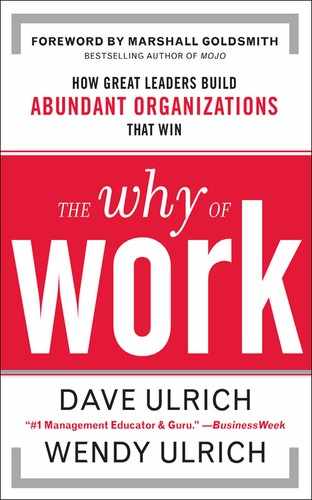FOREWORD
Why? What is the why behind The Why of Work? Why should you read this book? Why should you care?
In 1979, my largest leadership development client was IBM, which was then (by a large margin) the most admired company in the world. I was a frequent visitor to IBM corporate headquarters in Armonk, New York. On most workdays someone could fire a cannonball down the halls of corporate headquarters at 5:15 P.M. and hit no one. Even the professional and managerial employees worked 35 to 45 hours per week, took time off when they had minor health problems, and enjoyed five weeks of real vacation—with no cell phones or personal computers. They took comfort in the belief that they could look forward to a lifetime of guaranteed job security.
Those days—and those jobs—seem like a distant dream. Today the employees in that same building work 60 to 80 hours per week, keep on working through most health problems, and take almost no real vacation. They are not counting on any guaranteed job security.
This year I was developing an executive education seminar for one of the world’s most successful banks. I asked the coordinator of the session, “How many hours a week does the average executive in this program work?” His very sober answer was “Over 80!”
This book is written for leaders—and for professionals who aspire to be leaders. For both professionals and leaders the entire world of work has changed. Global competition, new technology, massive economic problems, and job insecurity have been factors in the creation of a new world of work. This new world of professional work is more challenging than at any time in my life.
If you are working 35 to 45 hours per week and take five weeks of real vacation, work-life balance may not be a huge issue. If you are working more than 50 hours per week and get almost no real vacation, then work-life balance has a very different meaning. For today’s professionals, if life is somehow disconnected from work, lots of us won’t have very meaningful lives.
This book would have been very important in 1979. This book is critically important today. It was needed then. It is really needed now!
In many developed countries, employee engagement is at an all-time low. It is past time for a turn-around.
I know of no couple who can address the why of work better than Dave and Wendy Ulrich. Dave is one of the world’s great business thinkers. I respect his work more than anyone in his field. Dave is an expert in understanding how organizations are impacted by individuals. Wendy Ulrich represents the “micro” to Dave’s “macro.” Wendy is a wonderful psychologist who deeply understands how individuals are impacted by organizations. Along with being great thinkers and professionals, Dave and Wendy are great human beings. They truly care about the organizations and people that they touch. They are dedicated to helping leaders created more effective organizations and helping human beings have more fulfilling lives. They wrote this book because they want to help you, the reader, and your organization achieve more abundance.
Peter Drucker once told me, “The leader of the past knew how to tell. The leader of the future will know how to ask.” Today’s leaders and professionals continually interact with knowledge workers. Peter taught us that knowledge workers are any employees who know more about what they are doing than we do. I guess that if we knew more about what was going on in other professional’s work than they did, we could just tell them what to do and how to do it. In today’s complex world, no leader or employee knows more than the knowledgeable professionals that surround us. We all have to ask for other people’s ideas, listen, and learn.
Dave and Wendy have followed Peter Drucker’s lead and organized this book around the asking of seven wonderful questions. By asking these questions—to ourselves and the members of our teams—listening to the responses and learning, we can create a more abundant world of work for both companies and the individuals who populate these companies.
The answers to the seven questions in The Way of Work will help you and your organization: develop a positive identity, gain real commitment, build positive relationships, create a great environment, find deeper meaning, achieve continuous learning, and experience true happiness. What can be more important than that?
I want to end this Foreword with a challenge. Don’t just read this book as a dispassionate observer; apply what you learn in each chapter to yourself and to your organization. Use these seven questions as a mirror to help you understand yourself and your organization.
The world will not become a better place because we learn—the world will only become a better place when we do.
What is the why in the work behind The Why of Work? Dave and Wendy Ulrich have years of invaluable experience in individual and organizational advising, research, study, and reflection. The Why of Work is a wonderful synthesis of their years of learning. I can say without doubt that my life is better and more abundant because I have learned from Dave and Wendy. This book is intended to help you and your organization have a better and more abundant life.
Read The Why of Work—and then do something that is much more important—do the work that is needed to help yourself, the people you love, and your organization have a better and more abundant life!
—Marshall Goldsmith is the author of the New York Times and international bestsellers Mojo and What Got You Here Won’t Get You There, the Harold Longman Award winner for Business Book of the Year. He lives in Rancho Santa Fe, California, and New York City.
